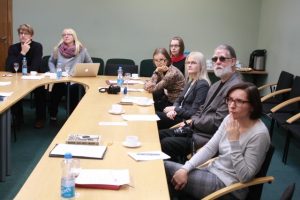On 4 November, the National Library of Lithuania hosted a discussion about Lithuania in the pages of Western media in 1990s and today; Vilnius Santara-Sviesa Club and Lituanica Department organized it.

Valdonė Budreckaitė, senior researcher at Lituanica Department, began with a virtual exhibition “No, my friends, we won‘t go slow,” dedicated to the time in history when Lithuania was fighting for its independence and its depiction in Western press. The exhibition was prepared by the Lituanica Department in cooperation with the Ministry of Foreign Affairs of the Republic of Lithuania. Gintė Damušis, a Lithuanian diplomat, who in 1979-1991 led the Lithuanian Information Centre with its offices in New York and Washington, D.C., shared memories about the dissemination of information and an important role played by the LIC in promoting Lithuania’s independence in the US and other Western countries. Vykintas Pugačiauskas, foreign news editor at the Lithuanian National Radio and Television, discussed Lithuania’s image in contemporary media. Georgia Gwinnett College professor, Dr. Dovilė Budrytė, who also currently teaches at the Institute of International Relations and Political Science at Vilnius University, moderated the event.
 On 3 November 2015 the Martynas Mažvydas National Library of Lithuania hosted the annual international Baltic Heritage Network diaspora seminar. It was the 22nd event in the last six years and the second to be held in Vilnius. It brought together researchers, librarians and archivists from all three Baltic countries working in the field of diaspora studies. In this international forum, eight papers were presented. Topics for three paper sessions ranged from collecting, exploring and digitizing archival data to making field research of diaspora communities, and analysing exile literature.
On 3 November 2015 the Martynas Mažvydas National Library of Lithuania hosted the annual international Baltic Heritage Network diaspora seminar. It was the 22nd event in the last six years and the second to be held in Vilnius. It brought together researchers, librarians and archivists from all three Baltic countries working in the field of diaspora studies. In this international forum, eight papers were presented. Topics for three paper sessions ranged from collecting, exploring and digitizing archival data to making field research of diaspora communities, and analysing exile literature.